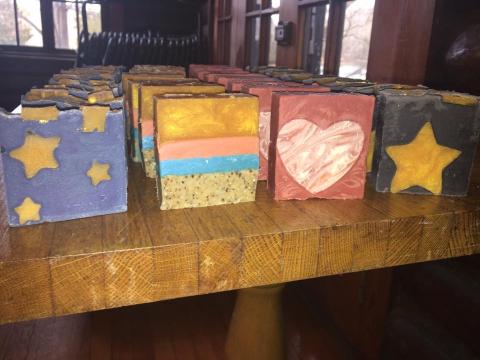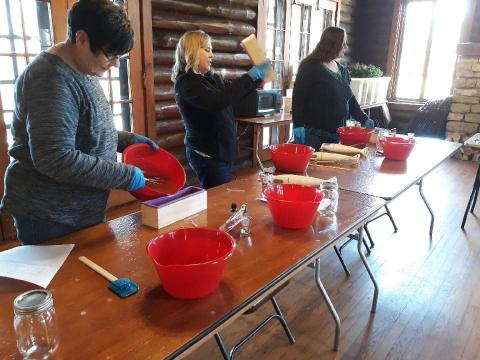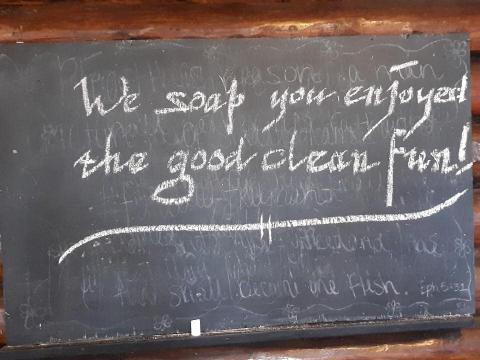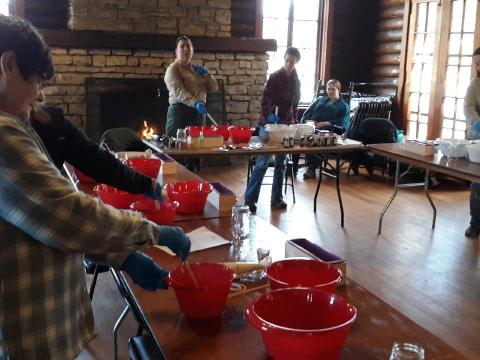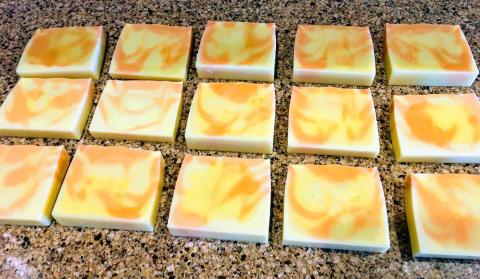Good Clean Fun at Big Ridge State Park
Homemaking soaps is a centuries old skill that many have the desire to learn. Recently, Big Ridge State Park has offered a class teaching these skills to pupils from the community. Ranger Hannah Paschall, who has been with the park for ten years, has led three sessions, only generating more interest. Classes were held in January, February, and are scheduled for March at the Big Ridge State Park Rec Hall. Ranger Hannah says that she expected the first class to fill up quickly, but she did not realize a second class would fill up in a day. The third class went even faster filling up in three hours!
The class was restricted to six participants per session in order to give everyone personal attention and assistance with whatever they need. Also because of working with lye, which if mishandled can cause severe burns, a small class allows her to focus on everyone to make sure all safety measures are followed. She focuses on teaching class members all the steps to correctly and safely make cold process lye soap. Ranger Hannah jokes, “We’re just having some good clean fun!” Although the class is filled with fun and laughter, her number one tip is to always, always follow proper safety procedure.
There are many benefits to making soaps at home. Homemade soap is made with all natural ingredients and doesn’t contain any harsh chemicals. The naturally occurring glycerin is perfect for moisturizing your skin and the addition of essential oils and botanicals can provide relief and healing to several skin conditions. If attending one of the park’s sessions, all you need is to show up in the appropriate clothing, everything else is provided. But, to make the soap at home you’ll need bowls, gloves, a mixer, fats and oils for the soap base, lye, scent oils, and colorants. In Ranger Hannah’s classes, participants make cold process lye soap, made with olive oil, coconut oil, and palm oil. Every participant makes the same base but is offered a variety of scents, essential oils, and natural colorants to customize their soap. For those who have attended one of these soap making classes, be on the lookout for an advanced class where she will teach a more detailed, more decorative technique.
Ranger Hannah had been curious about soap making for some time and thought, “If this is something I would want to learn, then there’s probably several other people who want to as well.” So, she did her research and taught herself. She started out making melt and pour soaps purchased from craft stores, eventually purchasing a book with step by step instructions on making lye soap. After reading the book, binge watching YouTube videos, and some trial and error, she had the process mastered. Since providing programs is her favorite part of her job, she dove in and scheduled the sessions.
When asked why they were interested in learning the skill, class members heavily varied in response. One participant had skin sensitivity issues and had to spend a lot of money purchasing handmade soap from a variety of vendors, so she jumped at the chance to learn to make it herself. A classmate makes and sells homemade items and wanted to learn this skill to add to her repertoire. Several partakers expressed a sense of nostalgia from watching their grandmothers make soap, and they wanted to learn to do it themselves. Ranger Hannah enjoys getting to know the people who attend. She says, “Providing programs like this lets me meet people from all walks of life. And especially with these workshop type programs, there’s always the sense of pride afterwards, when people have not only made something with their own hands but also gained a new skill.”
Over the last several years Big Ridge has been going through a revitalizing phase. Part of that revitalization is with the programs offered to the community. Dozens of free programs and community service projects allow them to teach visitors about the environment and the park’s story. They have also started adding in several fee based programs, like the soap making class. This allows the park to bring in some additional revenue that can be put directly back into the park. During the winter months’, workshop type programs are hosted. The rest of the year they host a wide variety of programs for the public, from big programs like weekend long backpacking trips and Jr Ranger Camp, to smaller guided hikes and guided kayak floats. During the summer, a seasonal worker is hired whose entire job is to provide free programs for the public. Any programs at the park provide an opportunity for the community to get the whole family out for some fun, learning, and adventure. The rangers believe that appreciation leads to conservation. When the community enjoys and appreciates the park, they’ll play a more active role in its conservation and preservation for future generations.
For anyone interested in the programs, Ranger Hannah can be contacted by email at Hannah.Paschall@tn.gov, and anyone who has questions about the park, facilities, and programs offered, call the office at 865-992-5523. Watch for future programs on social media, Facebook, Instagram, etc., but all upcoming events can be seen on the official Big Ridge State Park webpage at Tnstateparks.com/parks/big-ridge. Anyone can register for programs through the website as well.
- Log in to post comments
